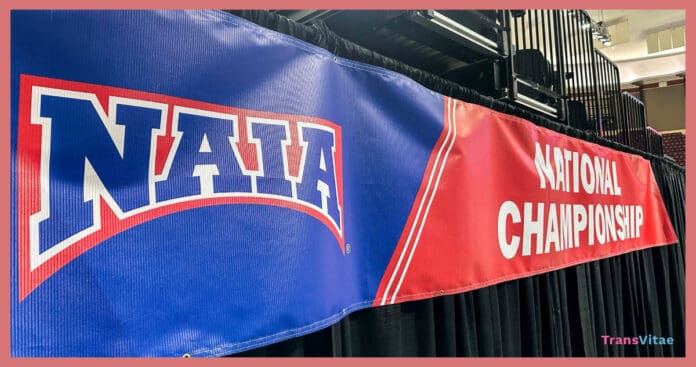In a pivotal move that has reverberated across the collegiate sports landscape, the National Association of Intercollegiate Athletics (NAIA) has introduced a policy that significantly restricts transgender athletes’ participation in women’s sports. This decision, made during the NAIA Council of Presidents’ annual convention in Kansas City, Missouri, is a groundbreaking moment in college athletics. With a unanimous 20-0 vote, the policy establishes the NAIA as the first collegiate sports organization to implement such restrictive measures.
The policy, slated for implementation in August, stipulates that all athletes may engage in NAIA-sponsored male sports. However, only those whose biological sex assigned at birth is female and who have not commenced hormone therapy are eligible to participate in women’s sports. Students who have started hormone therapy can participate in non-competitive activities such as workouts, practices, and team events. However, they are not allowed to compete in intercollegiate sports, except for NAIA programs in competitive cheer and dance, which are open to all students.
Jim Carr, NAIA President and CEO, acknowledged the contentious nature of this policy. He emphasized the organization’s commitment to fairness in competition as the driving force behind the decision, while also striving to accommodate some level of participation for all students. This stance reflects a complex balance between inclusivity and competitive fairness, a debate at the heart of ongoing discussions regarding transgender athletes’ rights.
The policy revision coincides with a broader national discourse on the rights of transgender athletes, as more than a dozen current and former college athletes have recently sued the NCAA for allowing transgender women to compete in women’s sports. The NCAA, governing over 500,000 athletes, has maintained a more inclusive stance, underscoring its commitment to promoting Title IX and ensuring fair competition for all student-athletes.
However, the NAIA’s decision aligns more closely with the actions of several states that have enacted laws to restrict the participation of transgender women and girls in women’s sports. This combination of state laws and organizational policies highlights a fragmented approach to addressing the complex issues surrounding transgender athletes’ participation in sports.
Critics of the NAIA’s policy, like Shiwali Patel of the National Women’s Law Center, argue that such measures constitute blatant discrimination. They contend that these policies do not enhance fairness but rather perpetuate exclusion and harmful stereotypes. This sentiment reflects the concern that restricting transgender athletes’ participation does not solve the purported issues of competitive balance but instead marginalizes already vulnerable populations.
The debate over transgender athletes’ rights in sports is indicative of broader societal discussions about gender, inclusivity, and fairness. While some view the NAIA’s policy as necessary for maintaining competitive integrity, others see it as a discriminatory measure that undermines the principles of equality and inclusivity. As legal challenges to similar policies persist, the conversation around transgender athletes’ rights is likely to remain a contentious and evolving issue.
The NAIA’s decision also highlights the role of religious and cultural beliefs in shaping institutional policies. With a significant number of NAIA schools having religious affiliations, these values naturally influence organizational decisions. This connection between sports, education, and belief systems complicates the path toward a universally acceptable solution to the participation of transgender athletes in collegiate sports.
As the trans community and its allies navigate these challenging waters, the importance of dialogue, empathy, and understanding becomes ever more crucial. The sports world, reflective of society at large, is grappling with how best to balance individual rights with collective fairness. Moving forward requires a thoughtful approach that respects the dignity and rights of all athletes, ensuring that sports remain a domain where everyone has the opportunity to compete, grow, and thrive.
As this issue unfolds, the trans community and its supporters must continue to advocate for policies that recognize the diversity of human experience and promote an inclusive environment for all athletes. The debate over transgender athletes’ participation in sports is more than just about competition; it’s about acknowledging and respecting the identity and rights of every individual.
In navigating these complex waters, the conversation must remain open, informed, and empathetic, recognizing the fundamental human rights at stake. The NAIA’s policy may set a precedent, but the dialogue it sparks could lead to more inclusive and equitable approaches to sports participation in the future.


